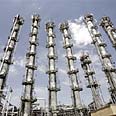
Report: Nuclear race in Mideast
Six Arab countries in Mideast, including Saudi Arabia, Egypt, Morocco notify IAEA of plans to develop nuclear technology, according to Times report. Expert on nuclear proliferation assesses: Nations want ‘security hedge’ in light of Iran nuke plan
As Iran’s development of nuclear technology occupies the world stage, the nuclear race in the Arab world was apparently hiked up a notch as six more Arab nations announced their intention to launch nuclear programs, according to a report in British newspaper the Times.
According to the International Atomic Energy Agency (IAEA), Algeria, Egypt, Morocco, Tunisia, Saudia Arabia and the United Arab Emirates have consulted the organization on programs to build nuclear reactors.
The six Arab nations plan to develop civilian nuclear energy, which is permitted according to international law. However, their interest in developing atomic technology rouses suspicions of an underlying purpose to apply the acquired technology to the development of nuclear weapons.
"Some Middle East states, including Egypt, Morocco, Algeria and Saudi Arabia, have shown initial interest (in using) nuclear power primarily for desalination purposes,” Tomihiro Taniguch, the deputy director-general of the IAEA, was quoted in the Times. He noted that the IAEA met with the Arab nations to set up technical advisory programs.
Security hedge
Expert on nuclear proliferation at the International Institute for Strategic Studies, Mark Fitzpatrick said it was clear the sudden rush for nuclear know-how was to provide a “security hedge” for the Arabs nations.
“If Iran was not on the path to a nuclear weapons capability you would probably not see this sudden rush (in the Arab world),” he said.
The declarations of intent by the six countries,
if they prove to be accurate, indicates a drastic reversal in policy among the area’s Arab nations, which up until now have pressed for a nuclear-free Middle East.
According to the Times, Egypt and the North African countries can somewhat justifiably cite the need for cheap, safe energy, considering their expanding economies and growing populations and the high price-tag on oil.
Saudi Arabia on the other hand, the article notes, holds the world’s largest oil reserves. Earlier this year Saudi Foreign Minister Prince Saud al-Faisal said his country opposed the spread of nuclear power in the Arab world.










